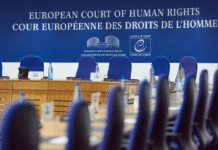A Turkish court has for the second time refused to enforce a binding Constitutional Court ruling ordering a retrial for jailed urban planner Tayfun Kahraman, this time rejecting the appeal through a brief procedural decision that avoided addressing the top court’s findings, the Bianet news website reported.
Kahraman’s wife, Meriç Kahraman, said the Istanbul 14th High Criminal Court dismissed their 32-page objection in a two-sentence decision, adding that the court cited its heavy agenda to justify offering no detailed reasoning. She said the decision made no reference to the Constitutional Court’s finding that her husband’s right to a fair trial had been violated.
The ruling reflects a shift in how lower courts are resisting the Constitutional Court. When the Istanbul 13th High Criminal Court rejected the retrial order on November 6, it openly accused the Constitutional Court of overstepping its authority. The 14th High Criminal Court did not repeat that argument. Instead it endorsed the 13th criminal court’s decision as lawful under Law No. 6216, a procedural stance that avoids confronting the Constitutional Court directly while still refusing to enforce its binding judgment.
Kahraman’s lawyer, Cansu Çiftçi, criticized the 14th criminal court for failing to respond to any of the arguments in their petition. She cited Article 153 of the constitution, which states that Constitutional Court rulings are final and binding on all branches of government and all individuals. She said they will file a new application with the Constitutional Court, arguing that its authority is being disregarded in a way that violates rights not only for Kahraman but for every citizen.
The Constitutional Court ruled on July 31 that Kahraman’s right to a fair trial had been violated and said he should be retried. On November 6 the Istanbul 13th High Criminal Court rejected the retrial order, accusing the Constitutional Court of acting outside its jurisdiction and denying both the retrial and the request for release.
Kahraman was among eight defendants convicted in April 2022 of aiding an attempt to overthrow the government in connection with the 2013 Gezi Park protests.
The Gezi Park protests, which began over an urban development plan in central İstanbul in the summer of 2013 and spread to other cities in Turkey, posed a serious challenge to the rule of then-prime minister and current president Recep Tayyip Erdoğan. They were violently suppressed by the government of Erdoğan, who later labelled the protests as a “coup attempt” against him.
Kahraman received an 18-year sentence, upheld on appeal in December 2022 by the Istanbul Regional Court and in September 2023 by Turkey’s Supreme Court of Appeals.
The European Commission’s 2025 report on Turkey warned that a weak separation of powers between the executive and the judiciary persists, with political pressure on courts and prosecutors continuing and that high-profile rulings by Turkey’s Constitutional Court remain unimplemented.
Turkey was ranked 118th among 142 countries in the World Justice Project’s 2025 Rule of Law Index.















